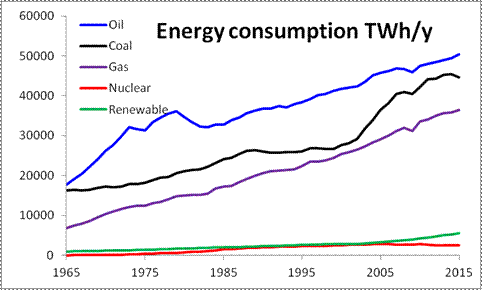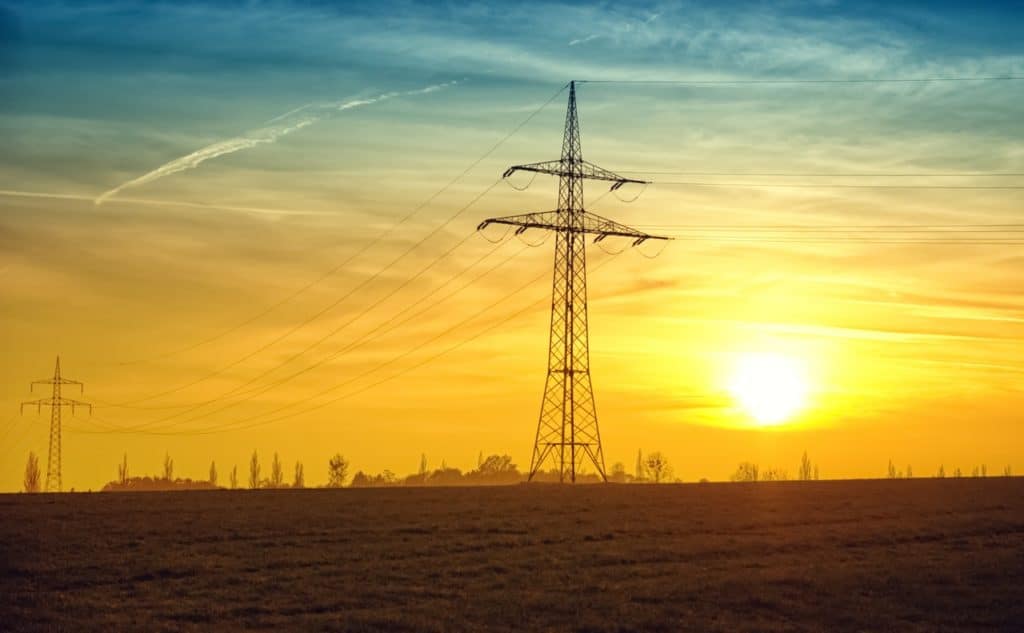 Worldwide the demand for energy is growing rapidly. Developing countries are rapidly increasing their need for energy and therefore adding their fair share. As the demand for energy is growing much faster then the supply of renewable energy is, the total CO2 consumption keeps growing. In the graph below you can see that oil and coal are still the biggest energy sources, even though they are by far the most polluting ones. Renewables make up less than 2% of the total.
Worldwide the demand for energy is growing rapidly. Developing countries are rapidly increasing their need for energy and therefore adding their fair share. As the demand for energy is growing much faster then the supply of renewable energy is, the total CO2 consumption keeps growing. In the graph below you can see that oil and coal are still the biggest energy sources, even though they are by far the most polluting ones. Renewables make up less than 2% of the total.
Alternative energy
So it is clear that we need an alternative for oil and coal, but renewable energy is simply not growing fast enough. With all the investments and technological developments, it still makes up less than 2% of the total. With the environment rapidly running out of control, we have to admit that need to alter our approach.
With oil and coal being the most polluting sources of energy, it is clear that those are not alternative options. Coal alone is responsible for over 800.000 premature deaths per year! Gas is slightly better, but still has a high output of CO2 and is slowly running out. If we would completely switch to gas we would quickly run out of our supplies.
The only alternative left is Nuclear Energy.
Nuclear Energy
There is a lot of confusion about Nuclear Energy, and this causes a lot of misinformation. In this part we would like to highlight a few key points about nuclear energy that are very important:
- Nuclear Energy is the cleanest source of energy currently available.
- Nuclear Energy has the lowest amount of deaths per kWh energy produced.
- Nuclear Energy has the potential to rapidly provide the required energy.
Nuclear Energy is Clean
This one always causes a lot of debate, but there is a range of research showing that Nuclear Energy is by far the cleanest form of energy. The resulting CO2 emission per kWh are even less than solar and wind, and can be generated 24 hours a day. Solar is dependent on the Sun and turbines need wind, but nuclear can operate around the clock.
When you take everything into account, including transportation, construction, generation, etc, the total life cycle of Nuclear comes to around 11g CO2/kWh. Solar sits around 40g, and coal is at the top around 800g CO2 per kWh.
Nuclear power plants generate nuclear waste. The waste is probably the most commonly used arguments against nuclear energy. After the creation of energy we are left with a small amount of nuclear waste. This highly radioactive material will remain that way for hundreds of years to come. However, the waste output of a nuclear power plant is incredibly small. Whereas other sources simply release their waste into the atmosphere, nuclear can actually easily be contained. We have the knowledge and capability to store this waste safe and secure. In a perfect world we would see no waste at all, but with time running out we have to take this waste for granted, while building towards real sustainable sources.
Nuclear Energy is safe
We all remember the horrific images of the Chernobyl disaster, the worst nuclear accident in human history. This event calls up a lot of emotion, but once we look into the data you might be surprised. During the worst nuclear accident ever, ‘only’ 31 people died due to direct causes, and another 15 are estimated due to indirect causes. This is still 46 people too many, but if you compare this to coal, oil and gas this amount is tiny. We already mentioned that coal is the cause of 800.000 premature deaths per year. Compare that to 46 people in the total recorded history, and nuclear does not seem that bad.
Even the amount of people that died in the production, installation and operation of renewable energy is higher than Nuclear Energy. If you look at the total amounts of deaths per energy source, nuclear is simply the safest.
That is not too say that the dangers of nuclear energy should be underestimated. In fact, we have drawn many lessons from Chernobyl. Modern nuclear power plants have a whole range of safety precautions that would make another Chernobyl impossible. Whereas in Chernobyl the nuclear proces would simply continue when there was no human intervention, modern plants actually require active intervention for anything to happen at all. When human intervention stops, so do the reactions.
Nuclear Energy seems to be the safest of all available options. And when taking into the account the recent developments and safety procedures it has become even safer. We should prevent obvious issues (like building in a hurricane area), but other than that nuclear energy can be considered a safe way of generating energy.
Nuclear Energy generates lots of power
The smallest nuclear power plant in the USA can generate 13,968 MWh per day. This is enough to power a small sized city. When you compare this to alternatives like windmill of solar, you would need thousands of these over a large amount of (limited) land to generate a similar amount. Even if you build that, you would still struggle with the periods where there is no wind or sunshine.
The output of one single nuclear power plant is enormous, and the placement of a few dozen would be enough to power up a complete continent. When planning ahead and making sure these plants are build in safe surroundings, nuclear power could generate enough energy to provide us all the energy required.
Nuclear Energy for Sustainability
We know this is a highly debated topic, and many people will disagree with our thoughts. However, when you really look into the data you will find that almost every argument is in favor of nuclear energy. It is cleaner, safer and more reliable than any other energy source out there. With only 15 years left to keep climate change manageable, we need rapid and realistic solution. We argue that Nuclear Energy could be an important part of that solution.
Nuclear Energy will bring bring our CO2 emissions down. In the meantime we can keep developing renewable energy and develop alternative energy sources, like a Thorium reactor. We need a shift in mindset that will move us towards a more healthy society, reducing our individual carbon emissions and focusing on what really matters in live. Nuclear might be the tool that will give us enough time to accomplish that.
We currently do not have the luxury to wait for solar and wind energy to build up, we need rapid and urgent change. Nuclear Energy has a lot of negatives, but it might be the best answer we currently have.
What do you think about Nuclear Energy? Should it be part of our energy spectrum? Share your thoughts below.

